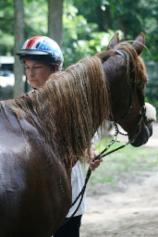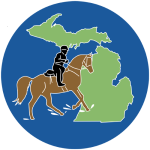
This page will serve as a resource for riders who are new to distance riding. Here you can find information about getting started in the sport, camping, conditioning, what to expect at your first ride and where to ask for help! GLDRA wants to help you on your journey of distance riding so please ask questions! gldraorg@gmail.com
Getting Started
- Find a Mentor!
- Mentors are a fantastic resource for new distance riders. They will help answer questions and give you a person to help guide you through conditioning your horse to your first ride.
- Attend a Clinic!
- Distance riding clinics walk you through everything involved with competing in a ride, from camping to completion! Some even offer a mock ride so you can get the full effect with your horse!
- Volunteer at a Ride!
- Volunteering is a great way to really understand and see first hand the process of distance rides. To volunteer, find a ride you can attend by looking at our ride schedule, then contact the ride manager listed and ask to volunteer! None of our rides function without volunteers!
- Check out this Article!
- Answering the top ten questions new distance riders ask.
- Glossary of distance riding terms
- Could be helpful when reading articles
Conditioning*
*Please keep in mind that each horse is different and will be starting from a different point.
These are guidelines and will need to be adjusted depending on you and your horse.
Mentors can help you figure out the best conditioning plan suited to your needs and goals!*
- Ride your horse!
- Ride 3-4 times a week
- Make at least 1 or 2 or those rides on trails
- Long Slow Distance
- Go on a long trail ride (8-15 miles) and just walk
- Go up and down hills and through thick sand if available
- Good rule of thumb
- Don’t increase speed and distance at the same time
- Work up to a 5-7mph pace
- Apps can help with calculating mph and mileage
- Check pulse, respiration and recovery rate after trotting to determine fitness
- Should recover to normal parameters after 10 minutes or before
- Article on pacing a distance horse
Camping
- If you have never camped with your horse, it is a good idea to research and try out different horse containment systems at or close to home to see what will work best.
- High line
- Electric or portable corral
- High Tie or Spring Tie
- Tie directly to trailer or hobbles
- These two options are not used frequently and are not recommend unless the other options don’t work for your horse
- Trail Meister is a great resource for camping with horses
- Many searchable articles/videos on camping and trailering
First Ride Event
- What to expect
- Checklist
- Ride Manager
- Will be listed on ride flyer
- Check in with manager when you arrive
- If manager station is not labeled, ask a fellow rider where it is located…they will be happy to help!
- Vet in
- Your horse must be examined before starting the ride
- Can be done the day before the ride or the morning of
- Less stressful to do the day before especially for a new rider
- Ride Meeting
- Don’t miss the ride meeting!
- Usually held the evening before the ride
- Map of trails, order of loops, water locations and other things to watch for
- Vet will go over vet check and completion criteria
- Ride time allowed and official time
- Tips for first ride
Other Helpful Links For New Riders
- Green Bean Challenge
- A way of competing specifically for those who have less than 1000 miles
- Can get points for learning and volunteering
- Compete individually or as a team!
- Safety and Etiquette
- Hydration
- Electrolytes
- AERC YouTube Videos
- Watch a vet check in action plus so much more!

